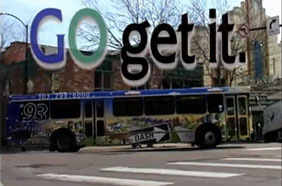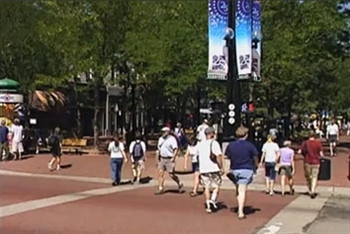
Wikimedia Commons
The city of Boulder as seen from the foothills of the Rockies
Set in the foothills of the Rocky Mountains and hosting a thriving university, Boulder, Colo., leads the way in managing one of the nation’s most advanced parking systems.
Established in September 1970, the Central Area General Improvement District (CAGID)oversees a 35-block district of parking facilities that include on-street curb parking, multiple parking garages and surface lots, totaling more than 4,000 spaces. Parking revenues in the CAGID are used as an economic development tool for downtown Boulder, paying for pedestrian and street improvements in the area and helping create a vibrant destination for visitors.
Essentially, Boulder maintains two pricing schemes, developed for its garage and street parking. Both assess variable pricing at 25-cent increments every 12 minutes, but while public garages charge fees 24 hours a day, metered spaces are only enforced from 9 a.m. to 7 p.m. Monday through Saturday. Additionally, after four hours, hourly rates in the garages increase to $2.50. This pricing system helps to manage congestion and parking demand while enhancing downtown access for pedestrians, transit commuters and motorists. In 2011, parking revenues amounted to more than $5 million for the CAGID (of which $1.4 million was from on-street meters and the rest derived from short- and long-term parking in lots and garages).

Eco-Pass Transit Program
Source: bouldercolorado.gov
CAGID parking meter revenues have enhanced transit and the pedestrian environment in downtown Boulder. Some parking meter revenues are dedicated to the Eco-Pass Program of the Regional Transportation District, the Denver-Boulder area transit agency. The program provides workers with public transportation alternatives to driving alone. Close to 6,000 downtown employees annually receive free unlimited-ride transit passes (a $750,000 to $800,000 expense in total). Additionally, in 2011 Boulder invested $50,000 in the BCycle bike share program. Parking meter revenues also funded streetscaping improvements for the downtown Pearl Street Mall and the enhancement of public Wi-Fi facilities.
Success in Boulder’s parking management system results from collaboration between the City of Boulder, University of Colorado and local businesses. Such partnerships have given the downtown a walkable, sustainable and socially-appealing ambience—an important business-booster for an area with over 200 shops and restaurants. According to an annual user survey, the vast majority of downtown customers found the district highly favorable, emphasizing the area's sense of place and overall atmosphere as its most positive attributes. Surely the improved parking regime has much to do with that success.

Downtown Boulder
Source: bouldercolorado.gov
Downtown Boulder’s efforts to transform parking spaces from simple automobile depositories into effective engines for economic development have paid off. It has become a national model for effective urban transportation practice, connecting it to the larger backdrop of a sustainable environment and a comprehensive transportation system. So as the little college town on the foothills of the Rockies, Boulder shows parking can too reach great heights.
Solving the Parking Predicament Series
MPC’s Solving the Parking Predicament series offers an in-depth discussion of parking management. Beginning with a review of the parking problem and new strategies to solve them, each case study highlights best practices from around the country:
- Parking Meter Zones in Old Pasadena, Cali.,
- The SFPark smartphone app in San Francisco,
- The meter and permit system in Oak Park, Ill.,
- Performance Based Parking in Washington, D.C.,
- The EPA-piloted Parking Benefit District in Austin, Tex.,
- The Parking Improvement District in Boulder, Colo., and
- Payment-in-Lieu of Parking in Miami’s Coconut Grove neighborhood.
These case studies will show how parking can develop out of a headache and into a demand strategy that facilitates and supports the use of alternative modes of transportation, builds business activity, and boosts community ambience.
Through CMAP’s Local Technical Assistance program, MPC is working with the Wicker Park/Bucktown Special Service Area to analyze how variable priced parking—charging different rates for parking based on shifts in demand at different times or days of the week—can achieve just the right number of available parking spots. The study also will determine if variable priced parking would create additional revenue to support neighborhood sidewalk and transit improvements—a spot-on solution for drivers, businesses and the community.